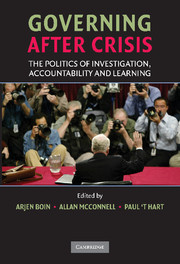1 - Governing after crisis
Published online by Cambridge University Press: 04 June 2010
Summary
The politics of crisis management: an introduction
In all societies, life as usual is punctuated from time to time by critical episodes marked by a sense of threat and uncertainty that shatters people's understanding of the world around them. We refer to these episodes in terms of crisis.
Crises are triggered in a variety of ways; for example, by natural forces (earthquakes, hurricanes, torrential rains, ice storms, epidemics and the like) or by the deliberate acts of ‘others’ (‘enemies’) inside or outside that society (international conflict and war, terrorist attacks, large-scale disturbances). But they may also find their roots in malfunctions of a society's sociotechnical and political administrative systems (infrastructure breakdowns, industrial accidents, economic busts and political scandals).
Some crises affect communities as a whole (think of floods or volcanic eruptions), others directly threaten only a few members of the community, but their occurrence is widely publicised and evokes incomprehension, indignation or fear in many others (child pornography rings, police corruption, bombing campaigns). Yet the very occurrence of critical episodes casts doubt on the adequacy of the people, institutions and practices that are supposed to either prevent such destructive impacts from happening or mitigate the impact if they do hit.
We define ‘crises’ as episodic breakdowns of familiar symbolic frameworks that legitimate the pre-existing sociopolitical order ('t Hart 1993).
- Type
- Chapter
- Information
- Governing after CrisisThe Politics of Investigation, Accountability and Learning, pp. 3 - 30Publisher: Cambridge University PressPrint publication year: 2008
References
- 31
- Cited by

